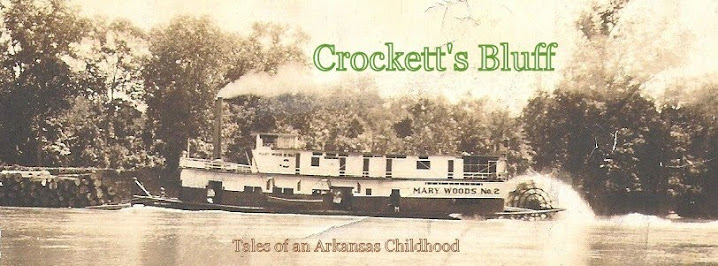 |
| Google's maps makes the route clear.** |
From Schwab's Store in Crockett's Bluff to St. Charles High School was about 10.5 miles. Straight south for about five miles on Route 153 and then east on Route 1. This was the basic bus route to the school from at least the 1930s until the school was closed. It was the route taken by the driver of a Model T Ford version whom David Prange identifies as "Miss Bessie? Dallas" -- shown below along with passengers Edgar and Bobby Turner.
It was likewise the same route I took when during my senior year 1952-3 I was hired to drive a relatively modern version compared with the Ford T. It had not only relatively conventional glass windows that could be lowered during the hot days of spring and fall but also a fairly decent heater during the winter months when most of my riders willingly sat toward the front to relish its advantages.
Our Principal Charles Downs thought it made sense, since I lived essentially at the end of the route, to save a clear fifty-percent of expenses by my simply keeping the bus under the old oak tree at our house overnight. I do recall I doubled back a mile or so west of the Bluff in order to pick up Roger McCallie; otherwise, students who lived close to the Woodiel house caught the bus there. Along the ten mile route students walked out from the homes to the bus route to be picked up.
Though it might appear little short of astonishing today that I, a barely 18 year old senior, was placed in charge of perhaps twenty or so students -- first grade through twelfth -- there was, to my knowledge not a single complaint. My word was law, and any student (and there were two or three) who presented me with a problem was treated to a free ride straight up to his door. In those days, believe it or not, he knew he was in serious trouble if I had to speak to his mother about his behavior.
Though I suspect somewhere there is a picture of the bus I drove -- one only slightly more modern than the late 1930s model shown below with "Miss Cora" Prange and her children August and Ida Carolyn -- but I've so far been unable to find one.
Obviously, there's much more to be said about this experience -- particularly in the contrasts of values it reflects and the confidence and responsibility of high school students -- but let this be it for the moment. [Again, I'm grateful to Jean Prange for this picture.]
**[The Rt. 1 extension around St. Charles was completed when the bridge replaced the ferry across the White River in 1982.]




